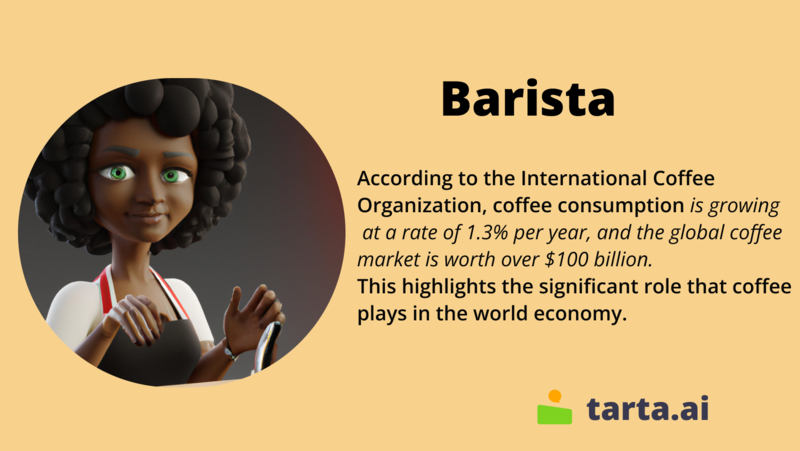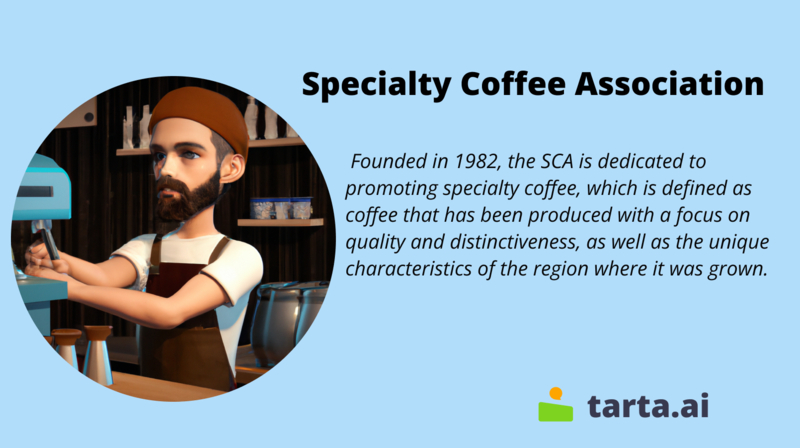Becoming a Barista: A Detailed Guide Into The Essentials Of The Job

Job description
A barista is a person who is trained and skilled in the art of preparing and serving coffee-based beverages. Baristas typically work in coffee shops, cafes, and restaurants, where they are responsible for making and serving various coffee drinks, such as espresso, cappuccino, latte, and macchiato. They use specialized equipment, such as espresso machines, grinders, and milk frothers, to create high-quality coffee drinks that meet the preferences of individual customers.
Requirements
Becoming a barista is more than just making coffee; it's an art form that requires a unique set of skills and knowledge. From selecting the perfect blend of beans to creating a beautiful latte art design, a barista's work is a true labor of love. However, this profession is not just about making great coffee; it's also about providing exceptional customer service and creating a welcoming environment for customers to enjoy their beverages. To become a successful barista, one must possess a blend of physical stamina, attention to detail, and multitasking abilities, as well as undergo proper training and certification. With these qualities, a barista can become a true master of their craft and bring joy to coffee lovers around the world.
Overall, becoming a barista requires a combination of knowledge, skills, and physical stamina, as well as a commitment to providing excellent customer service and producing high-quality coffee beverages.
Responsibilities
Main Responsibilities | Additional Responsibilities |
Greeting customers and taking orders | Creating and maintaining a clean and organized work environment |
Preparing and serving coffee and other beverages | Promoting and up-selling menu items |
Operating and maintaining coffee-making equipment | Maintaining inventory and restocking supplies |
Monitoring and controlling brewing parameters | Providing exceptional customer service and handling customer complaints |
Collecting and processing payment from customers | Training new baristas and sharing knowledge with team members |
Following health and safety regulations | Participating in team meetings and contributing to a positive team dynamic |
Maintaining knowledge of coffee trends and products | Conducting quality control tests and adjusting recipes as needed |
It's important to note that the specific responsibilities of a barista may vary depending on the coffee shop or cafe they work for, as well as their level of experience and expertise. However, these main and additional responsibilities provide a general idea of what a barista's job entails.
Skills
Behind the scenes of every successful coffee shop is a skilled and knowledgeable barista who has mastered the art of coffee-making. Baristas are not just coffee makers, but experts in their craft, possessing a wealth of knowledge about coffee blends, roasting methods, and brewing techniques. A great barista is not only an expert in coffee, but also a friendly and helpful customer service professional who pays attention to every detail of the brewing process. With the ability to multitask, communicate effectively, and manage time efficiently, baristas are the backbone of the coffee industry, bringing together their creativity and sales skills to create beautiful latte art designs and promote menu items to customers. So, here is a detailed look at the barista’s skills:
- Knowledge of coffee: Baristas must have a thorough knowledge of coffee, including different blends, roasting methods, and brewing techniques.
- Customer service: Baristas must have excellent customer service skills to interact with customers in a friendly, helpful, and efficient manner.
- Attention to detail: Baristas must be detail-oriented, as making the perfect espresso shot requires precise measurements and timing.
- Multitasking: Baristas must be able to handle multiple tasks simultaneously, such as taking orders, making drinks, and handling cash transactions.
- Communication: Baristas must be able to communicate effectively with customers and coworkers, both verbally and non-verbally.
- Physical stamina: Baristas must have physical stamina, as the job can be physically demanding, requiring standing for long periods of time and lifting heavy bags of coffee beans.
- Time management: Baristas must be able to manage their time effectively to ensure that all orders are completed quickly and accurately.
- Creativity: Baristas should have some level of creativity to be able to create beautiful latte art designs.
- Sales skills: Baristas should have some basic sales skills to promote menu items and up-sell to customers.
Overall, baristas require a blend of technical, interpersonal, and physical skills to be successful in their job.

Salary
The salary of a barista in the US can vary depending on factors such as location, experience, and the specific employer. According to data from the U.S. Bureau of Labor Statistics (BLS) as of May 2020, the median hourly wage for food and beverage serving workers, which includes baristas, was $12.68. However, the hourly wage for baristas can range from minimum wage to over $20 per hour, with some coffee shops and cafes offering additional benefits such as tips, health insurance, and retirement plans.
Also, according to data from the U.S. Bureau of Labor Statistics (BLS) as of May 2020, the median annual wage for food and beverage serving workers, which includes baristas, was $26,390. However, the annual salary for baristas can range from around $19,000 to over $42,000, depending on factors such as location, experience, and the specific employer.
It's important to note that the salary of a barista may also be supplemented by tips from customers, which can vary greatly depending on the coffee shop or cafe and the level of customer traffic.
Here is a table outlining the annual mean wage for food and beverage serving workers, which includes baristas, in different states of the US:
State | Annual Mean Wage |
Alabama | $21,460 |
Alaska | $33,060 |
Arizona | $25,080 |
Arkansas | $20,270 |
California | $32,840 |
Colorado | $28,470 |
Connecticut | $28,020 |
Delaware | $24,810 |
District of Columbia | $35,270 |
Florida | $24,220 |
Georgia | $22,870 |
Hawaii | $29,210 |
Idaho | $21,110 |
Illinois | $24,540 |
Indiana | $22,110 |
Iowa | $21,540 |
Kansas | $21,080 |
Kentucky | $21,200 |
Louisiana | $19,990 |
Maine | $24,490 |
Maryland | $26,650 |
Massachusetts | $28,450 |
Michigan | $22,530 |
Minnesota | $25,000 |
Mississippi | $20,280 |
Missouri | $21,580 |
Montana | $21,050 |
Nebraska | $21,710 |
Overall, while the salary of a barista may not be particularly high, the job can be rewarding for those who are passionate about coffee and enjoy interacting with customers. Additionally, some baristas may have opportunities to advance their careers and earn higher salaries by moving into management positions or opening their own coffee shops or cafes.
A detailed look into the factors that influence the earnings
- Experience: Baristas with more experience and expertise are often able to command higher wages than those who are just starting out.
- Employer: The specific employer can also influence a barista's earnings, as some coffee shops and cafes may offer higher wages or additional benefits like tips, health insurance, and retirement plans.
- Skills and qualifications: Baristas with specialized skills or qualifications, such as experience with latte art or training in coffee roasting, may be able to earn higher wages than those without these skills.
- Customer traffic: The level of customer traffic at the coffee shop or cafe can also impact a barista's earnings, as those working at busy locations may have more opportunities to earn tips and may be able to work more hours.
- Location: The location of the coffee shop or cafe where a barista works can have a significant impact on their earnings. In general, urban areas and regions with a higher cost of living tend to offer higher wages than rural areas and regions with a lower cost of living.
Overall, the earnings of a barista in the US can be influenced by a range of factors, and can vary significantly depending on the specific circumstances of the job.
Ways to improve earnings
- Gain experience and expertise: Experienced and skilled baristas are often able to command higher wages than those who are just starting out. By continuing to learn and develop their skills, baristas can increase their value to their employer and potentially earn higher wages.
- Specialize in a particular area: Baristas who specialize in a particular area, such as latte art or coffee roasting, may be able to earn higher wages by offering unique skills and services that set them apart from other baristas.
- Work at a high-traffic location: Working at a coffee shop or cafe that attracts a lot of customers can offer more opportunities to earn tips and potentially increase earnings.
- Pursue management or leadership roles: Baristas who are interested in advancing their careers can consider pursuing management or leadership roles within their organization, which may come with higher salaries and additional benefits.
- Consider working at specialty coffee shops: Specialty coffee shops that focus on high-quality, artisanal coffee and pay their employees well may offer higher wages than larger chain coffee shops.
- Seek out additional training and certifications: Baristas who obtain additional training and certifications, such as a certificate in coffee brewing or a food safety certification, may be able to earn higher wages and demonstrate their commitment to their craft.
Overall, there are several ways for a barista to improve their earnings, including developing their skills and expertise, seeking out high-traffic locations or specialty coffee shops, and pursuing management or leadership roles within their organization.

PHOTO: GETTY IMAGES
Additional benefits
Additional benefits that a barista may have at a workplace can vary depending on the employer and the specific coffee shop or cafe. However, some common benefits that employers may offer to baristas include:
- Health insurance: Some coffee shops and cafes offer health insurance benefits to their employees, which can help cover the costs of medical care.
- Retirement plans: Some employers may offer retirement plans, such as 401(k) plans, to help their employees save for their future.
- Paid time off: Baristas may be eligible for paid time off, such as vacation days or sick leave, which can provide a much-needed break from work and help employees take care of themselves and their families.
- Employee discounts: Some coffee shops and cafes offer discounts to their employees on food and beverages, which can help baristas save money and enjoy the products they work with.
- Education and training opportunities: Employers may offer opportunities for baristas to attend coffee-related events, workshops, or training programs, which can help them develop their skills and stay up-to-date with the latest trends in the industry.
Overall, while the wages of a barista may be a primary consideration when looking for employment, it's important to also consider the additional benefits that an employer may offer. These benefits can help improve the overall quality of life for baristas and show that the employer values their contributions to the business.
Job environment
A barista's job environment typically involves working in a coffee shop, café, or restaurant where coffee and espresso drinks are served. The work environment may be fast-paced and require the ability to multitask, as baristas often need to take orders, prepare drinks, and handle cash transactions all at once.
The tools used by baristas can include espresso machines, coffee grinders, steam wands, tampers, and milk frothers. They may also use various types of coffee beans, syrups, milk, and other ingredients to make a variety of drinks. In addition to preparing coffee and espresso drinks, baristas may also be responsible for cleaning and maintaining their equipment and work area.
The settings where baristas work can vary depending on the type of establishment they are employed in. Some coffee shops may have a more relaxed and casual atmosphere, while others may have a more formal or upscale feel. Baristas may work in a variety of locations, including standalone coffee shops, chain coffee shops, restaurants, hotels, and other food service establishments.
Overall, baristas work in a dynamic and fast-paced environment that requires skill, attention to detail, and excellent customer service. They must be able to work well under pressure and be able to adapt to changing circumstances, such as a sudden influx of customers or a change in menu items.
Work schedule
The average work schedule of a barista in the US can vary depending on the establishment they work for and their specific role within that establishment. Generally, baristas work part-time hours, although some may work full-time.
Part-time baristas may work anywhere from 10-30 hours per week, while full-time baristas may work 40 hours per week or more. Many coffee shops and cafes are open early in the morning and close in the evening, so baristas may work shifts that start as early as 5:00 or 6:00 am and end as late as 10:00 pm.
In addition to regular shifts, baristas may also be scheduled to work weekends, holidays, and other times when the coffee shop is particularly busy. Some coffee shops may also offer flexible scheduling, allowing baristas to request specific days or times off.
Overall, the work schedule of a barista can be flexible, but may require working early mornings, evenings, weekends, and holidays.
Fact
According to a survey conducted by the Specialty Coffee Association, which included responses from over 1,000 coffee professionals, around 44% of baristas reported working part-time, while 56% worked full-time.
Educational Courses for Barista
Baristas who want to increase their proficiency can take a variety of courses and training programs to improve their skills and knowledge. Some options include:
- Specialty Coffee Association (SCA) Courses: The SCA offers a range of courses on topics such as brewing, roasting, sensory skills, and green coffee. These courses are designed for coffee professionals and can help baristas gain a deeper understanding of the coffee industry.
- Barista Guild of America (BGA) Certification: The BGA offers several levels of certification for baristas, ranging from beginner to advanced. These certifications focus on practical skills, such as espresso preparation and latte art, as well as theoretical knowledge of coffee science and history.
- Local Coffee Training Programs: Many coffee shops and roasteries offer training programs for their staff. These programs can provide baristas with hands-on experience and personalized coaching from experienced coffee professionals.
- Online Courses and Resources: There are many online courses and resources available for baristas, including video tutorials, podcasts, and e-books. These can be a convenient and cost-effective way to learn new skills and stay up-to-date on industry trends.

What Licenses and Certifications are needed if you work as a Barista?
The specific licenses and certifications required for working as a barista may vary depending on the country or state in which you work. However, here are some common certifications and licenses that may be required or beneficial for a barista:
- Food handler's permit or certification: This certification demonstrates that you have completed a course on safe food handling and preparation. Some jurisdictions may require this certification for those who work in food service.
- ServeSafe certification: This is a certification program that teaches safe food handling practices and is often required by employers in the food service industry.
- Barista training certification: While not always required, completing a barista training program can be beneficial for those looking to work in the specialty coffee industry. These programs teach the skills necessary to prepare high-quality espresso drinks and latte art.
- TIPS certification: TIPS stands for Training for Intervention Procedures and is a program that teaches responsible alcohol service. This certification is not always required for baristas, but it may be beneficial if you work at a café or restaurant that serves alcoholic beverages.
- CPR and first aid certification: While not directly related to barista work, having CPR and first aid certification can be beneficial in any workplace.
It's always best to check with your local government or industry association to see what specific certifications and licenses are required in your area.

PHOTO: GETTY IMAGES
Ways of career development
- Continuing education and training: Baristas can take courses or attend workshops to improve their knowledge and skills in coffee preparation, customer service, and business management. These courses can be found through industry associations, coffee schools, or online platforms.
- Specialization: Baristas can specialize in a specific area of coffee preparation, such as latte art or specialty coffee brewing. By developing a unique skill set, baristas can stand out from others in the industry and potentially earn higher wages.
- Work experience: Baristas can gain valuable work experience by working at different coffee shops, restaurants, or cafes. This can provide them with a broader range of skills and experience in the industry.
- Networking: Building relationships with other baristas, coffee shop owners, and industry professionals can help baristas learn about new job opportunities, gain industry insights, and connect with potential mentors.
- Business ownership: Some baristas may choose to start their own coffee shop or café. This requires a broad range of skills, including business management, marketing, and financial management. By owning their own business, baristas can create their own unique coffee experience and potentially earn a higher income.
It's important for baristas to take a proactive approach to their career development by seeking out new opportunities, continuing to learn and grow their skills, and building relationships within the industry.
Alternative Careers and Similar Jobs
Job Title | Job Duties | Average Salary | Education/Training Required |
Café Manager | Oversees daily operations of a café or coffee shop | $47,000 | High school diploma or equivalent |
Roaster | Roasts and packages coffee beans for retail or wholesale | $35,000 | On-the-job training or coffee roasting course |
Coffee Shop Owner | Manages and operates a coffee shop or café | Varies | Business management experience |
Pastry Chef | Prepares and bakes pastries, cakes, and desserts | $49,700 | Culinary school or apprenticeship |
Food Service Manager | Oversees food service operations in a restaurant or café | $56,590 | Bachelor's degree and work experience |
Bartender | Prepares and serves alcoholic and non-alcoholic beverages | $24,680 | On-the-job training or bartending course |
Catering Manager | Plans and executes food service for events and gatherings | $50,820 | Bachelor's degree or related experience |
Baker | Prepares and bakes bread, cakes, and pastries | $29,000 | On-the-job training or culinary school |
It's important to note that salaries and education requirements may vary depending on the specific job and location. These job titles are just a few examples of alternative careers and similar jobs that baristas may be interested in pursuing.
Job Market
The job market for baristas in the United States can vary depending on the location and the specific coffee industry. Generally, the demand for baristas in the US is influenced by factors such as the number of coffee shops and cafes, the growth of the specialty coffee industry, and the seasonality of tourism in certain areas.
Fact
According to the Bureau of Labor Statistics, the employment of baristas and other food and beverage serving workers is projected to grow by 8% from 2020 to 2030, which is about as fast as the average for all occupations.
However, it's worth noting that the COVID-19 pandemic has had a significant impact on the food and beverage industry, which could impact job opportunities for baristas in the short term.
Overall, while the job market for baristas in the US can be competitive, there are still opportunities for those who are passionate about coffee and have the necessary skills and experience.

PHOTO: GETTY IMAGES
Job satisfaction
Are you considering a career as a barista and curious about what to expect? Being a barista can be a dynamic and exciting job that offers many perks, such as social interaction, creative expression, and flexible scheduling. However, like any job, there are also potential challenges to be aware of, including physically demanding work, low pay, and dealing with difficult customers. We will explore some of the advantages and disadvantages of working as a barista, so that you can make an informed decision about whether this profession is right for you. Whether you're a coffee enthusiast or simply exploring different career options, read on to discover more about what it's like to work as a barista. Here is a detailed outlook of the pros and cons of a barista’s job:
Advantages:
- Social interaction: Baristas often have the opportunity to interact with a diverse group of people, from regular customers to tourists, which can be enjoyable and provide an opportunity to develop strong customer service skills.
- Creative outlet: Making coffee drinks can be a form of creative expression, as baristas can experiment with different ingredients and presentation styles to craft unique and aesthetically pleasing beverages.
- Flexible scheduling: Many coffee shops offer flexible scheduling options, which can be great for individuals who have other commitments or prefer non-traditional work hours.
- Free or discounted coffee: As an employee, you may be able to enjoy free or discounted coffee drinks, which can be a nice perk.
- Transferable skills: Baristas develop a range of transferable skills, such as time management, multitasking, and teamwork, which can be valuable in a variety of other industries.
Disadvantages:
- Fast-paced and physically demanding work: The work can be physically demanding, as baristas are often on their feet for long periods of time and may need to lift heavy bags of coffee beans or milk jugs. The work can also be fast-paced and stressful during peak hours.
- Low pay: Baristas are typically paid hourly wages, which can be relatively low in some areas.
- Inconsistent work hours: Although flexible scheduling can be an advantage, it can also be a disadvantage if shifts are inconsistent and unpredictable.
- Repetitive work: Some baristas may find the work to be repetitive, as making coffee drinks can become routine.
- Dealing with difficult customers: Baristas may encounter difficult or demanding customers, which can be challenging to handle and may lead to customer service burnout.

PHOTO: GETTY IMAGES
- Baristas are in high demand: With the rise of specialty coffee shops and the continued popularity of coffee culture, the demand for skilled baristas is on the rise.
- Job growth is expected to be steady: According to the U.S. Bureau of Labor Statistics, employment of baristas is projected to grow 2 percent from 2019 to 2029, which is about as fast as the average for all occupations.
- Advancement opportunities may be limited: While there may be opportunities for advancement to management positions or to become a head barista, there may not be as many opportunities for career advancement compared to other fields.
- The pay may be lower compared to other professions: Baristas are typically paid hourly wages, which can be lower than other professions that require similar skills or experience.
- Experience and skills can make a difference: Baristas with more experience, skills, and knowledge of specialty coffee may be able to command higher pay or have more job opportunities.
FAQ
Is the demand for baristas growing?
Yes, the demand for skilled baristas is on the rise due to the increasing popularity of specialty coffee shops and coffee culture.
What is the projected job growth for baristas?
According to the U.S. Bureau of Labor Statistics, employment of baristas is projected to grow 2 percent from 2019 to 2029, which is about as fast as the average for all occupations.
Are there opportunities for advancement in the field of barista work
While there may be some opportunities for advancement to management positions or to become a head barista, there may not be as many opportunities for career advancement compared to other fields.
How much do baristas typically earn?
Baristas are typically paid hourly wages, which can vary depending on the location, but may be lower compared to other professions that require similar skills or experience.
Can experience and skills make a difference in a barista's pay or job opportunities?
Yes, baristas with more experience, skills, and knowledge of specialty coffee may be able to command higher pay or have more job opportunities.
What are some potential challenges of working as a barista?
Some potential challenges of working as a barista include physically demanding work, dealing with difficult customers, and lower pay compared to other professions.